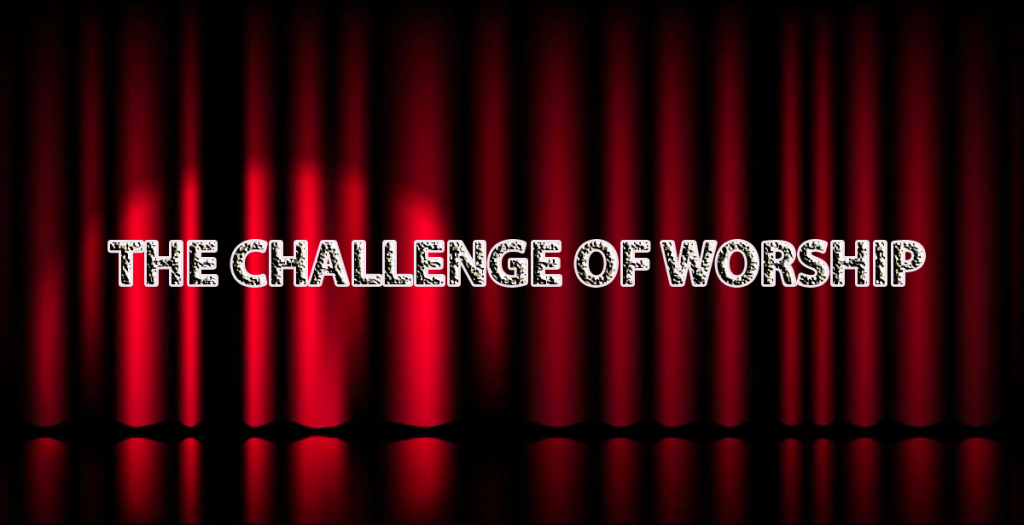THE CHALLENGE OF WORSHIP
Opening Prayer
Holy Spirit of Truth, direct my attention to Jesus so I might see what you want me to become.
Read PSALM 24
Psalm 24
Of David. A psalm.
1 The earth is the Lord’s, and everything in it,
the world, and all who live in it;
2 for he founded it on the seas
and established it on the waters.
3 Who may ascend the mountain of the Lord?
Who may stand in his holy place?
4 The one who has clean hands and a pure heart,
who does not trust in an idol
or swear by a false god.[a]
5 They will receive blessing from the Lord
and vindication from God their Savior.
6 Such is the generation of those who seek him,
who seek your face, God of Jacob.[b][c]
7 Lift up your heads, you gates;
be lifted up, you ancient doors,
that the King of glory may come in.
8 Who is this King of glory?
The Lord strong and mighty,
the Lord mighty in battle.
9 Lift up your heads, you gates;
lift them up, you ancient doors,
that the King of glory may come in.
10 Who is he, this King of glory?
The Lord Almighty—
he is the King of glory.
Footnotes
- Psalm 24:4 Or swear falsely
- Psalm 24:6 Two Hebrew manuscripts and Syriac (see also Septuagint); most Hebrew manuscripts face, Jacob
- Psalm 24:6 The Hebrew has Selah (a word of uncertain meaning) here and at the end of verse 10.
New International Version (NIV)Holy Bible, New International Version®, NIV® Copyright ©1973, 1978, 1984, 2011 by Biblica, Inc.® Used by permission. All rights reserved worldwide.
Meditate
‘I am the Lord; that is my name! I will not yield my glory to another or my praise to idols.’1 What is your response to this?
Think Further
This psalm’s theme is the kingship of God. Verses 1 and 2 are a hymn to God as Creator. Everything is his, since he created it. He is the Lord of all. We ought to recognize this lordship in our daily lives, in what we do, think and say. This is brought out in the brief, responsive, ‘entrance liturgy’ (vs 3–6). Maybe this psalm was first used at the dedication of the Temple.2 When worshippers arrive at the Temple gate they ask the gatekeeper, in essence, ‘Who is worthy to come here to worship God?’ The answer makes it clear that God’s primary concern is the moral and spiritual quality of their daily lives, not the offerings they bring or what they intend to say or sing in the Temple. Taken in an absolute way this would debar everyone from the Temple, because no one lives like this consistently! However, the point is that true commitment to God means commitment to this kind of life day by day. The worshippers respond that they are committed to this. Without this genuine commitment, worship in the sanctuary is sham worship. That is as true for us today as it was then.
The worshippers in Psalm 24 were in a procession carrying the Ark of the Covenant, which symbolized the presence of the God of Israel. God is depicted as a great warrior (v 8). In the early days the Ark was taken into battle.3 The title ‘The Lord Almighty’ (v 10, literally ‘The Lord of hosts’, NRSV) appears associated with the Ark.4 The worshippers’ demand that the Temple gates be opened to ‘the King of glory’. When asked by the gatekeeper who this King is, they reply that he is the warrior-king of Israel. We know him as the King who overcame the hosts of evil by his life, death, and resurrection.5
Apply
‘Seven whole days, not one in seven, I will praise thee’.6 Is that how you understand worship?
Closing prayer
Lord, you are interested in who I am. Forgive me for outwardly appearing to be more than I really am. May my worship and praise be truly from the heart.
1 Isa 42:8 2 1 Kings 8:3–5 3 Num 10:35,36 4 1 Sam 6:2 5 Col 2:15; Rev 19:11–16 6 George Herbert, 1593–1633, ‘King of glory, King of peace’
Book and Author Intros
Last Updated on December 4, 2022 by kingstar

